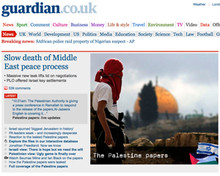
Over the past few months, Al-Jazeera has had access to nearly 1,700 files, which include memos, emails, maps, minutes from private meetings and strategy papers, dating from 1999 to 2010. It claims that it is the biggest leak in the history of the Middle East conflict, detailing continuing negotiations involving American, Israeli, and Palestinian Authority officials.
The Guardian claims it was given exclusive access to the 'Palestine Papers' by Al-Jazeera. The newspaper's coverage of the leaked documents will be supplemented by WikiLeaks cables from the US consulate in Jerusalem and embassy in Tel Aviv.
Al Jazeera has said it will not reveal the source(s) of the documents or detail how they came into their possession.
"We have taken great care over an extended period of time to assure ourselves of their authenticity," it said in a report introducing the papers.
"We believe this material will prove to be of inestimable value to journalists, scholars, historians, policymakers and the general public.
"We know that some of what is presented here will prove controversial, but it is our intention to inform, not harm, to spark debate and reflection – not dampen it."
Al-Jazeera also reminded readers that while a comments section had been provided for opinion to be expressed, comments deemed inappropriate will be removed.
"We present these papers as a service to our viewers and readers as a reflection of our fundamental belief – that public debate and public policies grow, flourish and endure when given air and light," it added.
According to the Guardian, the bulk of the documents are "records, contemporaneous notes and sections of verbatim transcripts of meetings drawn up by officials of the Palestinian negotiation support unit (NSU)".
The newspaper claims its has had the documents independently authenticated by former participants in the talks and by diplomatic and intelligence sources.
The documents have also been redacted to remove details such as email addresses, phone numbers or other information that could identify those who leaked them, the Guardian added.
Free daily newsletter
If you like our news and feature articles, you can sign up to receive our free daily (Mon-Fri) email newsletter (mobile friendly).









